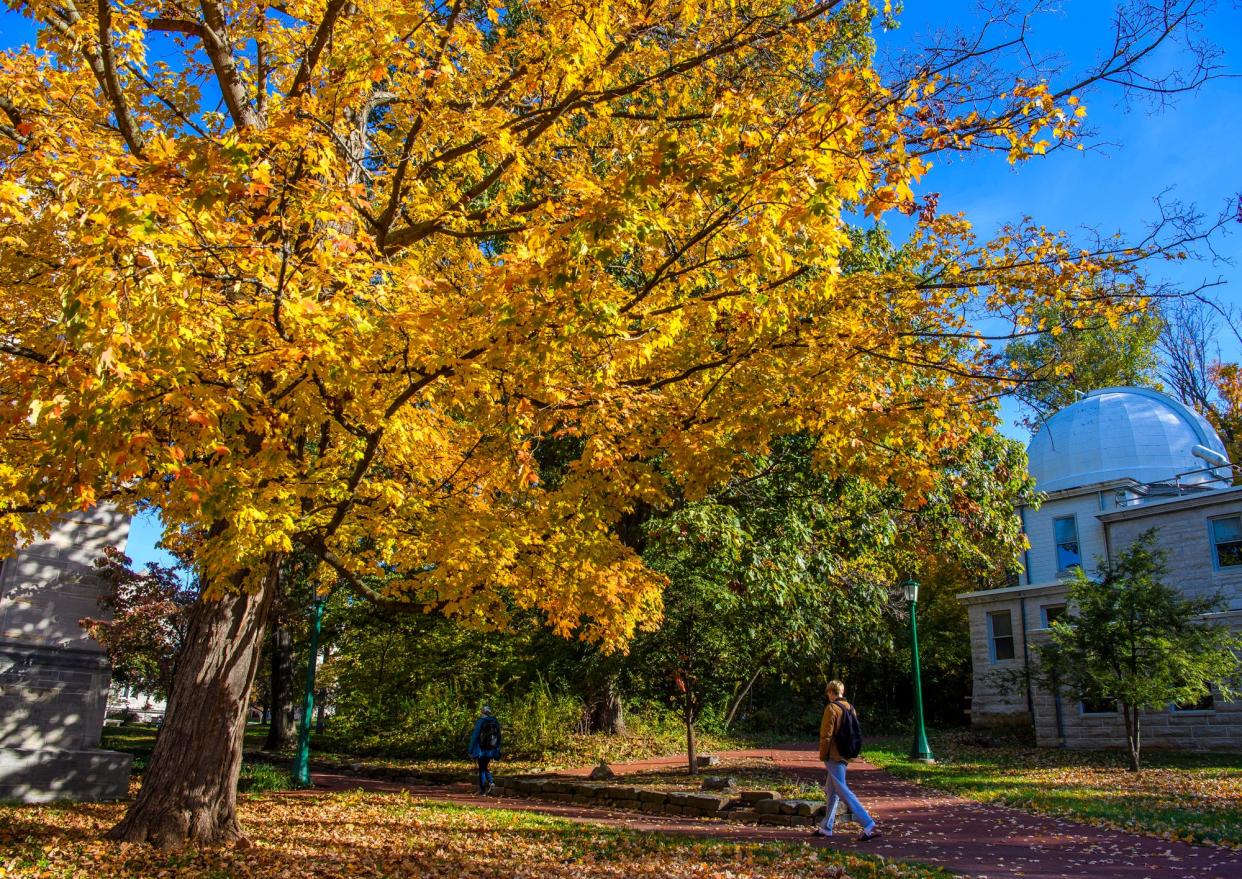'I definitely was not comfortable': Vaccinated IU students reject unvaccinated roommates

During the 2020-21 school year — with the exception of small number of granted roommate requests — all students living in Indiana University dorm rooms lived alone because of COVID-19 precautions.
Random roommate assignments, a freshman year tradition at colleges across the U.S., were once again allowed this year at IU. Although IU mandated all students receive the COVID-19 vaccine, not every student has gotten it.
While random assignments returned, IU updated its policy to deal with vaccine concerns.
More: IU students' lawsuit challenging COVID-19 vaccination mandate dismissed
“One of the stipulations that got written into that was that students who lived in the residence halls wouldn't have to live with someone who wasn't vaccinated or had a mismatch in status,” said Sara Ivey Lucas, IU director of residential life.
It led to IU having many unvaccinated students without a home. And in turn, IU has created dorms of unvaccinated students.
According to IU’s reported data, nearly 10% of the student body is not vaccinated. Indiana's Legislature passed a law preventing state or local governments from requiring vaccine passports, which Indiana Attorney General Todd Rokita said meant IU couldn't require proof of vaccination. That has left some students doubting the accuracy of IU’s data.
Booster questions: Confused about whether you can/should get a COVID-19 booster? You're not alone.
Ivey Lucas said between 500 and 1,000 students assigned to dorms had a mismatch in vaccination status. She said a large percentage — though did not specify how large — of students did not choose to change roommates.
But IU wasn’t able to find new roommates for all the unvaccinated students, as many vaccinated students felt uncomfortable living with them.
That has led to IU having to place groups of unvaccinated students together in dorms.
Most of those unvaccinated students without roommate matches were placed in the Willkie Center or Ashton Residence Center buildings. IU spokesperson Chuck Carney said in September there were just under 150 students living across two wings in Ashton.
Ashton is also IU’s quarantine and isolation dorm, although unvaccinated students and those in quarantine are in different buildings.
Outside Ashton, outdoor spaces are marked off for those in quarantine or isolation to get a break from their rooms. Thus many of IU’s unvaccinated students can look out their window and see the realities of fellow students who currently have COVID-19 or are dealing with having been exposed.
Changing IU COVID policy
In May, IU announced all students, faculty and staff would be required to receive the COVID-19 vaccine in order to return to campus. IU threatened having class registration, access to IU email and Canvas, as well as a student’s Crimson Card, canceled.
There were few exemptions, and IU’s Medical Response Team said it would be difficult to get an exemption. After Rokita's nonbinding opinion that IU couldn't require proof of vaccination, the school added more exemptions to its list. The list includes an undefined “ethical exemption” that was added in early July, soon after IU’s new president, Pamela Whitten, took her office.
More: Do COVID-19 vaccines present an ethical quandary? Philosophy professors, pastor weigh in
Carney said the ethical exemption was in line with the school’s previous flu shot mandate but did not define what qualifies as an ethical exemption. IU’s website states exemptions are reviewed by designated leaders and applicants will get a response within five business days. But some IU students said they received responses within seconds of submitting their exemption form, making them question if a human is reading them.
University-wide, 89.8% of all students, faculty and staff say they have received at least one dose of the vaccine according to IU’s COVID-19 dashboard as of Nov. 4. In Bloomington alone, 94.5% of students say they have had at least one dose of the vaccine.
The true number of vaccinated students on campus is unclear, as proof of vaccination is not required when students submit an attestation, and many are concerned some people have lied about being vaccinated. Also, IU is not providing detailed testing information for its unvaccinated population on its COVID-19 dashboard.
How do we count number of vaccinated?: Monroe County mask mandate to remain 'probably several weeks'
Carney said the issue of lying is a common question he gets, and he doesn’t see what incentive students would have to lie. IU has not discovered a student lying, Carney said, but if the school did find out, there could be disciplinary action. There isn’t tension on the dorm floors for the most part, students said. But there’s uncertainty about how safe campus actually is.
Life as an IU freshman in 2021
When Margo Hollander got the email asking if she wanted to live with her unvaccinated assigned roommate, her immediate feeling was shock. This wasn’t a decision she was expecting to have to make. This is the first freshman class to face worries over who around them is truly vaccinated against COVID-19.
Hollander’s decision, though, was simple.
“I definitely was not comfortable with it,” she said.
Neither was Belle Chatpunnarangsee, a freshman from Thailand living in Forest. She came to the United States alone early in August. She wasn’t able to get the vaccine in Thailand, but the first day she landed in Chicago, Chatpunnarangsee got her first shot. She received her second shot in early September.
Chatpunnarangsee said after she initially informed IU she did not want to live with an unvaccinated roommate, she was paired with another student who was not vaccinated.
“I assumed my new roommate was vaccinated, or planning to get vaccinated soon,” Chatpunnarangsee said. “I was confused, mainly, because I thought we had sorted it out.”
Chatpunnarangsee said IU did not inform her of this at first, and she only found out from talking with her newly assigned roommate. She asked RPS to make a change, again, and it was granted.
Living in Forest, Chatpunnarangsee does not have communal bathrooms. Each floor has around six individual unisex bathrooms that a resident can go in and lock the door. They are able to take their mask off freely there — masks are required in the hallways — without being around another unmasked student as they shower or brush their teeth.
In Foster, Hollander has communal bathrooms and does have to be around other unmasked students anytime she goes there.
“It’s concerning,” Hollander said. “But definitely not as scary as last year would have been.”
Both Hollander and Chatpunnarangsee are living in a dorm room meant for two people, but neither has a roommate. They each sleep alongside an empty navy-blue mattress, a constant reminder of the typical freshman experience they don’t have.
RPS told them both they can’t use the empty half of the room — there’s always a chance another person could be moved to their room. But Chatpunnarangsee and Hollander both doubt that will happen.
So the second bed in each room stays empty. Their whole freshman year might last that way.
“It’s a little disappointing,” Hollander said. “But it’s definitely better than being with someone who isn’t vaccinated.”

An unvaccinated Indiana University dorm
Normally, Ivey Lucas said, random roommate selection is exactly that, random. Those living in dorms are allowed to choose a roommate or have one randomly selected. At IU, it’s mostly freshmen living in dorms as most students choose to move off-campus following their freshman year.
This year though, there are additional considerations, Ivey Lucas said. While still random, vaccination status became a factor.
And when a vaccinated roommate did not want to live with an unvaccinated roommate, RPS needed to find a new place for them to be. For some, RPS was able to find a new room inside the same building where they were originally supposed to live. But for dozens of others, RPS found single rooms in different buildings for the unvaccinated student.
That meant putting many students in the Willkie Center and Ashton Residence Center. Monroe County Health Administrator Penny Caudill said this could create higher risk of COVID-19 spread.
“The ideal situation is that everybody’s vaccinated and everybody’s at low risk,” Caudill said. “Any facility, a home with four people or a dorm with 400 people or anything in between, if everybody is unvaccinated, there is a certainly higher level of risk.”
Caudill said the Monroe County Health Department does talk to IU on a regular basis, and was aware IU was giving students living in dorms the chance to choose if they were comfortable with an unvaccinated roommate. She said she was aware IU was trying to figure out accommodations for those people.
But Caudill said the Monroe County Health Department is not making decisions with or for IU and she was not aware of where the unvaccinated students are living.
Caudill said an unvaccinated student and a vaccinated one would not need to wear a mask in their own dorm room should they be living together as it is their personal living space. But Caudill ultimately wanted to defer to IU’s policy on masking indoors when it came to the unvaccinated students living together in the same building. IU’s policy states unvaccinated people should wear a mask in an indoor space unless they are alone in a room with a closed door.
All the unvaccinated students in Ashton are living in single rooms, Ivey Lucas said. She said IU has tried to treat them just like any other student on campus. Some students have become fully vaccinated since moving into Ashton and have been able to move back into their initially assigned room.
Ivey Lucas said IU faced many issues including worry of a potential COVID-19 outbreak when putting unvaccinated students in the same dorm. But IU feels confident enough in its weekly mandatory COVID-19 testing for unvaccinated students and believes that will limit spread.
And if a student in Ashton were to test positive, they’d pack a bag and move across the courtyard to the isolation building.
“There’s risk in everything we do,” Ivey Lucas said.
This article originally appeared on The Herald-Times: IU vaccine mandate: Students who haven't gotten COVID shot live alone

